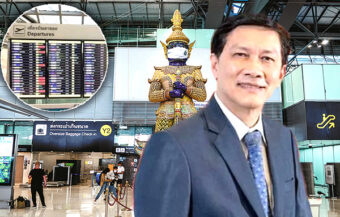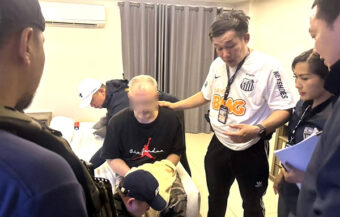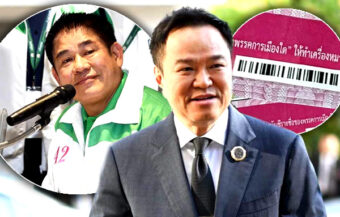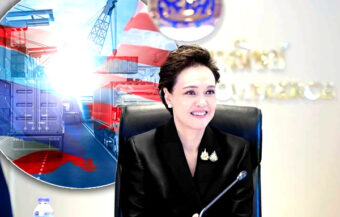Thaksin Shinawatra beams after acquittal on lèse-majesté charges. Lawyer warns any appeal must focus on points of law, stressing weak evidence, flawed witnesses and the court’s finding that the prosecution failed to link statements to the monarchy.
A beaming former Prime Minister Thaksin Shinawatra walked out of the Criminal Court on Friday, cleared of the lèse-majesté charges against him. The prosecution confirmed any appeal would be reviewed within 30 days by the Office of the Attorney-General (OAG), with a possible 30-day extension. However, Thaksin’s lawyer, Winyat Chatmontri, stressed that any appeal must focus strictly on points of law, noting the court had already found the evidence against his client insufficient. He slammed flaws in the prosecution’s case, highlighting problems with the interview recording and the credibility of key witnesses.
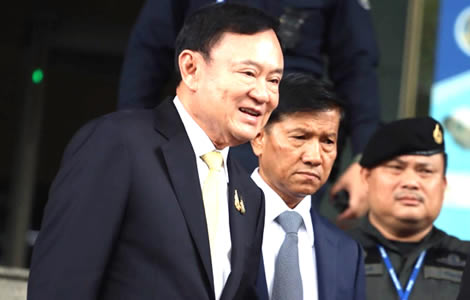
On Friday, former Prime Minister Thaksin Shinawatra celebrated his acquittal after the Criminal Court dismissed Section 112 and Computer Crimes Act charges. Later, his lawyer, Winyat Chatmontri, described the verdict as a moment of genuine relief. He emphasised that the evidence against Thaksin simply did not exist. Furthermore, the court stressed that neither the King nor the royal family was linked to Thaksin’s statements.
The case originated from a 2015 interview Thaksin gave to a South Korean newspaper, Chosun Ilbo. However, the prosecution alleged that parts of the interview violated Section 112. At length, the court carefully examined the video clip and found inconsistencies, including possible editing.
Consequently, the reliability of the prosecution’s evidence was questioned. In addition, the court highlighted that interpretation must follow grammatical and contextual principles.
Court questions credibility of prosecution’s witnesses and finds inconsistencies in video and interview evidence
Additionally, the court scrutinised witness testimony. Some prosecution witnesses were deemed biased and inconsistent. Furthermore, their statements contained political opinions, which weakened credibility. The court also examined whether witnesses gave conflicting statements during the investigation and in court. Consequently, it concluded that the evidence could not meet the burden of proof.
Mr. Winyat explained that the court applied grammatical and contextual analysis to the interview. For example, the pronoun “he” did not specifically refer to the King. Moreover, foreign dictionaries were consulted to clarify word meanings. Therefore, the elements of the alleged offence did not fall under Section 112. In addition, the court confirmed that the defendant’s burden of proof was limited to his own testimony.
The court also found that Thaksin’s witnesses possessed expertise and knowledge. Consequently, their interpretation of the evidence carried significant weight. Furthermore, Thaksin consistently denied wrongdoing, ensuring the burden of proof remained with the prosecution. Additionally, the court questioned the authenticity of the video clip and the procedures followed during the investigation.
Verdict highlights insufficiency of evidence against Thaksin and gave weight to defence witnesses
Following the verdict, Mr. Winyat called for an end to legal actions targeting political opponents. He also urged the public to exercise judgment and rely on facts. Moreover, he emphasised that legal analysis must be separated from political assumptions. In addition, he described Thaksin’s acquittal as an opportunity for him to contribute further to the nation. Furthermore, he highlighted that lessons from this case could guide future Section 112 cases.
He confirmed that his legal team would petition to lift the travel ban on Thaksin. Certainly, Thaksin will attend the Supreme Court’s final review of his incarceration from August 2023 to February 2024, scheduled for September 19. In addition, Mr. Winyat stressed that the legal process will continue in an orderly manner. Consequently, Thaksin remains fully engaged and focused.
Meanwhile, the prosecutor may file an appeal. However, any appeal must follow proper legal procedures. According to the Attorney General’s office, the decision rests with the OAG. First, the prosecutor must request a transcript of the verdict for review. Subsequently, the OAG will submit its opinion to the Deputy Attorney General.
Then, the Deputy Attorney General will forward recommendations to the Attorney General. Finally, the Attorney General will decide whether to appeal within 30 days. If necessary, an extension may be requested.
Post verdict appeal decision depends on a review by the Attorney General within 30 days. Possible extension
Mr. Winyat clarified that any appeal would focus solely on points of law, not factual determinations. Of course, he expressed confidence that the case’s record was clear. At the same time, he emphasised that the legal team will address any appeal responsibly. He particularly warned that public pressure should not dictate judicial outcomes. “I do not want the court to become a tool of conflict,” he said.
During the judgment reading, Thaksin appeared calm and composed. Nonetheless, he smiled when the court noted that prosecution witnesses lacked sufficient credibility. This reaction was natural, considering the seriousness of the accusations against the ex-Premier.
In addition, Mr. Winyat described the verdict as vindication for his client, who he said had been unjustly targeted. Furthermore, he underlined that the case demonstrated the importance of credible evidence.
After the acquittal, Thaksin thanked his legal team and reaffirmed his commitment to public service. Furthermore, he intends to work tirelessly for the nation. In turn, Mr. Winyat highlighted that the court’s judgment was based on evidence, not favouritism. He noted that the court carefully considered cross-examination questions and the prosecution’s extensive evidence. Additionally, he emphasised that legal rigour must guide all Section 112 cases.
Thaksin vindicated as court highlights evidence-based judgment and clears political implications of case
The lawyer also discussed the broader implications of Section 112 cases. He warned that authorities have historically used the law to target dissent. Certainly, while not every defendant deserves sympathy, legal interpretations must remain separate from political motives. Therefore, he argued that Section 112 is often applied to serve political purposes. In addition, he encouraged the public to scrutinise such cases carefully.
Regarding future travel, Mr. Winyat confirmed that Thaksin is legally considered innocent. Following the outcome, the legal team will petition to remove the travel restriction. Thaksin also confirmed that he will not travel immediately.
Certainly, he will attend the 14th-floor hearing on September 9. Furthermore, he pointed out that the former PM personally reviewed all evidence and cross-examined witnesses to ensure accuracy. Mr. Thaksin undeniably remains fully committed to the judicial process.
Public concerns about Thaksin fleeing were addressed. In short, Mr. Winyat emphasised that such concerns are unfounded. Historical precedent shows that Thaksin has consistently faced legal challenges without evading accountability.
Thaksin’s travel ban and plans as lawyer addresses unfounded public concerns about his possible flight
In addition, he urged the public to rely on reason and evidence rather than assumptions. Past evidence proves that Thaksin has consistently participated in legal proceedings. Furthermore, he stated that public wisdom should guide perception of these events.
On Friday, family members and political figures attended the verdict session. Their presence demonstrated the high profile of this case. Among attendees were Thaksin’s daughters and former ministers, including Suchart Thadathomrongwet. Undoubtedly, the occasion emphasised the political and national significance of these legal proceedings. At 10:41 a.m., the Criminal Court formally dismissed the charges.
The case, filed as Case No. 1860/2567, involved allegations stemming from the May 2015 South Korean interview. The prosecution alleged violations of Section 112 and the Computer Crimes Act. Before Friday’s decision, hearings included prosecution witnesses from July 1 to 3 and defence witnesses on July 16.
Thaksin and legal experts testified, ensuring the defence presented a robust case. Significantly, all sessions were closed to the public due to the sensitivity of the matter. Furthermore, the court highlighted that procedural fairness was carefully maintained.
Family and political figures saw the court dismissal as procedural fairness. Sure of former PM’s innocence
The court concluded that the video clip did not establish wrongdoing. Furthermore, witness testimony was inconsistent and politically influenced. By weighing all evidence carefully, the court applied the burden of proof fairly and thoroughly. Mr. Winyat described the decision as an affirmation of legal rigour. Indeed, he emphasised that careful evidence evaluation is critical in politically sensitive cases.
He stressed that Section 112 cases require close scrutiny due to political implications. Misuse of the law undermines public trust and distorts justice. He emphasised that political objectives should not influence legal procedures. Furthermore, courts should not be exploited to settle political disputes.
Afterwards, the former PM smiled, expressed gratitude to his legal team, and reaffirmed his intention to serve the nation. Later, the travel ban will be addressed legally, but Thaksin will attend all upcoming hearings.
Thaksin acquitted of lèse-majesté by the Criminal Court in Bangkok. Outcome expected but still sweet
Thaksin’s D-Day before Criminal Court on lèse-majesté. Thailand’s top political player faces judgment
Observers highlighted that the acquittal may set a precedent for other Section 112 cases. For instance, careful review of evidence, witness credibility and the burden of proof could shape future rulings. Moreover, consistent application of the law is crucial in politically sensitive matters. Friday’s verdict emphasised the importance of judicial independence.
In addition, the judgment highlighted the significance of evidence-based decision-making. Mr. Winyat concluded that Thaksin remains fully engaged and committed to national service.
Join the Thai News forum, follow Thai Examiner on Facebook here
Receive all our stories as they come out on Telegram here
Follow Thai Examiner here
Further reading:
Thaksin acquitted of lèse-majesté by the Criminal Court in Bangkok. Outcome expected but still sweet
Prime Minister Paetongtarn Shinawatra a no-show at cabinet and an appointment with Pheu Thai MPs



